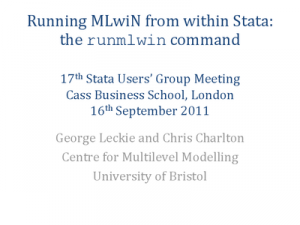In the past, I did a lot of multi-level modelling with MLwiN 2.02, which I quickly learned to loath. Back in the late 1990s, MLwiN was perhaps the first ML software that had a somewhat intuitive interface, i.e. it allowed one to build a model by pointing and clicking. Moreover, it printed updated estimates on the screen while cycling merrily through the parameter space. That was sort of cool, as it could take minutes to reach convergence, and without the updating, one would never have been sure that the program had not crashed yet. Which it did quite often, even for simple models.
Worse than the bugs was the lack of proper scriptability. Pointing and clicking loses its appeal when you need to run the same model on 12 different datasets, or when you are looking at three variants of the same model and 10 recodes of the same variable. Throw in the desire to semi-automatically re-compile the findings from these exercises into two nice tables for inclusion in again and again after finding yet another problem with a model, and you will agree that any piece of software that is not scriptable is pretty useless for scientists.
MLwiN’s command language was unreliable and woefully underdocumented, and everything was a pain. So I embraced xtmixed when it came along with Stata 9/10, which solved all of these problems.

But xtmixed is slow with large datsets/complex models. It relies on quadrature, which is exact but computationally intensive. MLwiN works with approximations of the likelihood function (quick and dirty) or MCMC (strictly speaking a Bayesian approach, but people don’t ask to many questions because it tends to be faster than quadrature). Moreover, MLwiN can run a lot of fancy models that xtmixed cannot, because it is a highly specialised program that has been around for a very long time.
Enter the good people over at the Centre for Multilevel Modelling at Bristol, who have come up with runmlwin, an ado that essentially makes the functionality of MLwiN available as a Stata command, postestimation analysis and all. Can’t wait to see if this works with Linux, wine and my ancient binaries, too.
Discover more from kai arzheimer
Subscribe to get the latest posts sent to your email.

That got interesting when you mentioned Wine. I’d be interested to hear if you have any success with that.
@Brendan Halpin Have no access to my ancient binaries right now, but this is interesting enough to consider upgrading. Will let you know if I have any success with this.
@Brendan Halpin Under Linux, you cannot install runmlwin from within Stata, because runmlwin lacks a Linux plugin at the moment. However, the plugin is not strictly required, so a manual install should work in principle – see here: http://www.cmm.bristol.ac.uk/forum/viewtopic.php?f=3&t=426&p=894&sid=adcd8c16ff07e8a5be52aec922d1fa77#p894
Will check this out when I have time.